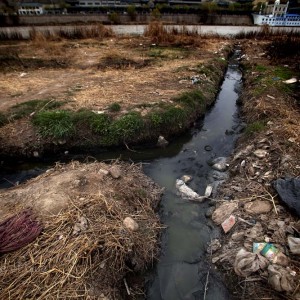Federal Water Tap, January 21: Flawed Levees, Flushed Science
The U.S. Army Corps of Engineers, in its first-ever inventory of the state of federal flood control systems, found that 22 percent of the levees surveyed were rated “unacceptable”, according to the Associated Press. The corps, claiming the threat of terrorism and sabotage, would not say why those levees were so rated. Some 40 percent of federal levees have yet to be assessed.
Energy Industry Pushes EPA
Bowing to pressure from an energy company implicated in a groundwater contamination case, the U.S. Environmental Protection Agency shelved research into why a Texas homeowner’s well suddenly had methane in the water, the Associated Press reports.
Range Resources, the company implicated by the research, told the EPA it would not cooperate with a larger federal study of hydraulic fracturing if the agency continued the investigation of the Texas site.
Toxics
More toxic chemicals in 2011 were spewed, dumped or flushed into the nation’s air, land and water than the year before, according to the U.S. Environmental Protection Agency’s 2011 Toxic Release Inventory, published last week. The EPA hangs blame for the 8 percent increase on the metals mining sector, which increased the amount of waste it dumps on land. Chemicals put into surface water declined by 3 percent.
Sandy Dollars
The House of Representatives passed a $US 50.7 billion Superstorm Sandy aid package. In addition to the billions for transit systems, community development grants, and Army Corps projects, the bill includes $US 600 million for the state revolving funds for clean water and drinking water in EPA’s Region 2, the region where the storm hit. The Senate is expected to consider the measure this week.
Everglades
The 12-year-old federal-state partnership to restore the Everglades has made “little progress” to improve the system’s hydrology, concludes a biennial assessment report from the National Research Council. Most projects are happening along the Everglades’ periphery; projects that would deliver the greatest benefits have been delayed.
Climate Change Negotiations
At a meeting in Abu Dhabi, Todd Stern, the lead U.S. climate negotiator, laid out three principles for a new climate treaty: ambition, differentiation, and flexibility.
Invasive Species
The Army Corps of Engineers is soliciting public comments on a list of methods to prevent aquatic invasive species from moving between the Mississippi River Basin and the Great Lakes. Of the 90 options proposed in a 2010 paper, a few – chemicals typically used as industrial disinfectant, plastic lakebed covers, and a hot-water barrier – have been eliminated. The corps also wants to hear about methods it might not have considered. Comments are due February 21 and can be submitted via the above link.
Missouri River
The Army Corps will prepare an environmental review for its Missouri River Recovery Program to protect endangered species and restore ecosystems along the river’s upper basin, in the states of Montana, Nebraska, North Dakota and South Dakota. The corps was authorized to take on such a program by the 2007 Water Resources Development Act.
Federal Water Tap is a weekly digest spotting trends in U.S. government water policy. To get more water news, follow Circle of Blue on Twitter and sign up for our newsletter.
Brett writes about agriculture, energy, infrastructure, and the politics and economics of water in the United States. He also writes the Federal Water Tap, Circle of Blue’s weekly digest of U.S. government water news. He is the winner of two Society of Environmental Journalists reporting awards, one of the top honors in American environmental journalism: first place for explanatory reporting for a series on septic system pollution in the United States(2016) and third place for beat reporting in a small market (2014). He received the Sierra Club’s Distinguished Service Award in 2018. Brett lives in Seattle, where he hikes the mountains and bakes pies. Contact Brett Walton





Leave a Reply
Want to join the discussion?Feel free to contribute!